|
Ever wanted to meet a conservation biologist? The Birch Aquarium in La Jolla, CA is hosting lab member Sheila Madrak this Saturday, March 21st from 11 AM - 3 PM to discuss and share her interests in sea turtles, spatial ecology, and marine conservation. There will be fun activities and crafts for all ages. If you can't make the event, make sure to check out an interview with Sheila here!
1 Comment
Dr. Rebecca Lewison is the lead author of a paper released today in BioScience that promotes an adaptive approach, using real-time data, to managing ocean ecosystems and the resources within our oceans. Lewison and her coauthors suggest that by incorporating flexibility into the management framework and putting science to work, these complex systems can be better managed, striking a balance between ocean resource use and conservation. Read more in the SDSU NewsCenter press release or BioScience.
“The era of outreach being optional for scientists is now over,” blogs Jai Ranganathan on the Scientific American website as funding agencies like NSF require outreach in competitive grant proposals. One of the best ways for scientists to reach out to the community is by connecting with local K-12 schools, giving researchers an opportunity to share their passion for science with an impressionable audience of students, engaging a new generation in scientific literacy and critical thinking. A new study led by former Lewison Lab masters student Dr. Lisa Komoroske and her colleagues from UC Davis participated in an NSF-funded education program CAMEOS at the Bodega Marine Lab and share their insights on how scientists can involve themselves with teaching opportunities and how to maximize their efforts in the classroom. The article explores the obstacles that impede scientists’ involvement in K-12 education: finding time to step away from research, lack of experience in collaborating with grade school educators, and an undervaluation of outreach in academic culture. The NSF has been promoting a cultural shift by requiring broader impacts in grant funding and offering training and incentives to potential teachers. Scientists can also use their experience in the classroom to write publishable papers about education. Despite the challenges, scientist participation in K-12 education can make a research career more fulfilling while promoting critical thinking in the next generation of scientists. 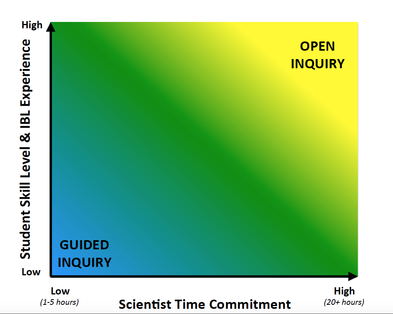 This figure taken from Komoroske et al. 2015 shows that the type of IBL projects that can be successfully undertaken in the classroom depend on the availability of the scientist and the skill level of the students. If the scientist has limited time and/or the students are at an introductory level, Guided Inquiry is best. If the scientist has more time to commit and the students are advanced, an Open Inquiry approach is feasible. Alexander Gaos, a PhD Candidate in the Lewison Lab, recently helped spearhead research into a previously undiscovered hawksbill sea turtle hotspot in the Choco region of Colombia. During the short expedition, the research team, which in addition to San Diego State, included such organizations the World Wildlife Fund, the Eastern Pacific Hawksbill Initiative, CIMAD and Colombian National Parks, located 11 hawksbills inhabiting a pristine coral reef in the waters of Utria National Park. Gaos' current Doctoral research seeks to understand connectivity between this and other hawksbill populations in neighboring countries using genetic tools. Read more about the recent expedition to Colombia HERE. Learn more about the events leading up to this discovery and Alexander's work as highlighted in San Diego's Newspaper UT San Diego or by visiting our Research page.
Lewison Lab post-doctoral researcher, Megan Jennings, has been working to evaluate wildlife movement across State Route 67, a rural highway in San Diego County that has proven to be dangerous to people and wildlife. The California Department of Transportation, CalTrans, has been working to make the highway safer, and we're helping them study how to do that for wildlife. Check out this video to see Megan discuss our CalTrans-funded research to assess wildlife movement across the highway and identify safe and appropriate road crossings. 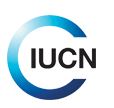 The IUCN is the World Conservation Union, the first global environmental organization and a leading authority on the environment and sustainable development. The IUCN works to influence, encourage and assist societies throughout the world to conserve the integrity and diversity of nature and to ensure that any use of natural resources is equitable and ecologically sustainable. Want to learn more? https://www.youtube.com/watch?v=w7GQZsGmW5Y The Lewison Lab is part of the IUCN Specialist Survival Commission. To learn more about our IUCN work, go to http://www.iucn.org/about/work/programmes/species/who_we_are/ssc_specialist_groups_and_red_list_authorities_directory/mammals/ More than 20 years ago, an accidental ecological experiment began when the infamous drug lord, Pablo Escobar, died and his private collection of exotic wildlife wandered off his compound in Antioquia, Colombia. The hippos that were part of that collection have now reproduced and their population has grown and appears to be thriving in the water-rich Colombian rainforest. Listen in to an interview with WBEZ's Worldview where Dr. Rebecca Lewison shares her knowledge of hippos and discusses what to make of the hippos of Colombia.
Research in the lab has long been focused on understanding landscape and seascape connectivity - how animals move, or don't move, across the landscape. From desert tortoises and bobcats, to sea turtles and sharks, a number of projects are working to improve tools and approaches to understand how animal movement patterns over time are shaping the populations we observe. To find out more about one project, go to http://newscenter.sdsu.edu/sdsu_newscenter/news.aspx?s=75148
|
Archives
February 2024
AuthorThe Lewison Lab Categories |
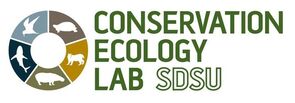
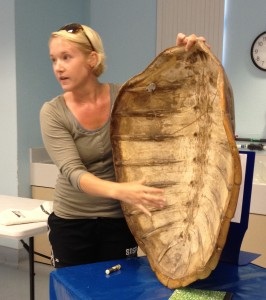
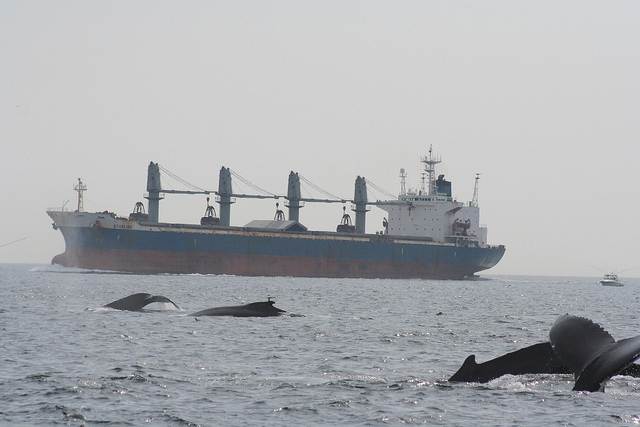

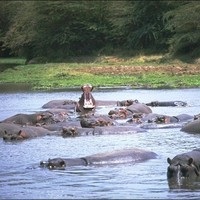
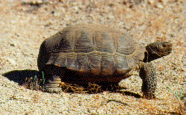
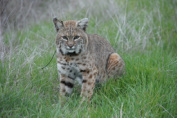
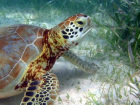
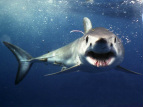
 RSS Feed
RSS Feed
